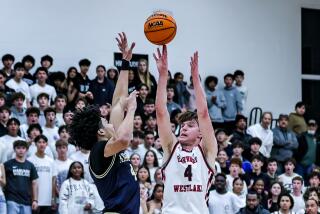THE HIGH SCHOOLS : Coaches Won’t Stand for Order to Sit
- Share via
The National Federation of State High School Assns. adopted a bench decorum rule this season designed to discourage coaches from inciting the crowd and badgering game officials.
The rule confines coaches to their seats unless they want a timeout or are applauding an outstanding play.
Statistics compiled by the Southern Section office indicate that the rule is working. Only four coaches have been ejected from games this season, compared to 14 at this time last season. Crowd incidents are also on the decline.
But does that mean the rule has been successful? According to the coaches, the answer is no.
Consistency seems to be the major problem.
“Some officials call it by the book and others don’t,” said Coach Bob Braswell of Cleveland High. “It’s gotten to the point that I now make sure that I talk to the officials before the game and ask them how they’re going to call it.”
Dean Crowley, a Southern Section administrator, said that a bulletin was sent to officials instructing them to explain the rule to the coaches before the game.
“They have basically been told that they cannot ignore the rule completely, but to use common sense when making a call,” Crowley said.
Unfortunately, there have been cases when such discretion was not used.
Said Crowley, who also officiates high school and college games: “I saw one tournament game, played in a packed gym before a very vociferous crowd, where an official turned his back on play to call a technical foul on a coach who was up out of his seat instructing his team.
“The score was tied and it was late in the game. While he was turned around, an intentional foul was made, which the official didn’t see because he had his back turned. Instead of having two free throws, the other team gets two shots and then possession of the ball. There went the game.”
At the Eldorado Tournament in Las Vegas last month, Simi Valley Coach Bob Hawking was whistled for two technical fouls--and he didn’t say a word.
He was given the first when he stood up to call a timeout just before the half. Then, with his team trailing by two points with less than two minutes left in the game, Hawking was hit with a technical when he dropped to one knee in front of his seat.
“He must have been waiting for me to slip up again,” Hawking said later. “As soon as my knee touched, he called it. In L. A., officials usually use a lot more common sense and logic in dealing with the rule. If you’re in their face, you get a technical. But if you’re up coaching, there’s no call. And that’s the way it should be.”
Braswell, whose team plays in the City Section, said that the rule may have directly cost his team a victory.
His team was leading by a point with less than 30 seconds left in a nonleague game against Dorsey when Braswell stood to call an inbounds play over the roar of a large crowd. He was whistled for a technical and Dorsey made two free throws, got possession of the ball and was able to run out the clock.
“In the majority of our games, the rule has not been enforced,” Braswell said. “I had one official tell me, ‘Coach, we have more to worry about than whether or not you’re sitting on the bench.’ Most officials feel the same way, I think. They don’t want to worry about monitoring the sidelines.”
Said Crowley: “Philosophically, we don’t care much for the rule. It restricts coaches from doing what they are paid to do, and that is coach basketball. There are times when it is necessary that a coach must be off the bench to coach his team. If he’s off yelling at officials, then he would have gotten a technical under the old rules.”
Crowley said that he received a letter recently informing him that Oklahoma high schools had modified the rule at mid-season. Coaches there are now allowed to walk on the sidelines as long as they are coaching and not hollering at the officials.
It is a rule that should be easier for both officials and coaches to accept.
“There has been more written and more said about this rule change than any other rule change in the last five years,” Crowley said. “We will take a good look at the rule at the end of the season, after we compile the results to a survey of coaches and officials’ organizations.”
Braswell said that some officials have already decided among themselves that the rule will be scrapped by the City Section next season.
The coaches would undoubtedly greet that news with a standing ovation.
Unless they’re afraid of getting whistled for a technical.
More to Read
Get our high school sports newsletter
Prep Rally is devoted to the SoCal high school sports experience, bringing you scores, stories and a behind-the-scenes look at what makes prep sports so popular.
You may occasionally receive promotional content from the Los Angeles Times.






